In-Depth
Redmond's 2014 Salary Survey: Cloud Clout
It was a breakout year for Microsoft Azure, and IT pros with skills in the company's cloud technology are the highest earners in the 19th annual Redmond Salary Survey.
IT professionals who have jumped on the Microsoft Azure and Big Data bandwagon have done well this year, while those with more traditional technology skills saw modest increases in their average salaries and in some cases slight declines, depending on their specialties.
In a year where wage growth in the United States was relatively flat -- generally less than 2 percent -- the average salary among the readership of Redmond magazine grew a paltry .5 percent, the lowest increase in several years. Last year average salaries were 3 percent greater and in 2012 they were up 3.25 percent. Compensation this year has shifted in a variety of specialties, according to the 19th annual Redmond Salary Survey, which was fielded in late October.
Among those whose average salaries were higher this year were IT pros reporting they specialize in Microsoft-centric technologies and products including Active Directory, Exchange Server, SQL Server, System Center and Windows (server more so than client), with Lync and Windows PowerShell showing sharply greater average salaries. Those earning less this year were respondents specializing in Hyper-V, Office and Office 365. While some of the shifts in compensation are curious -- for example, Hyper-V deployments are on the rise -- experts say the reasons for such anomalies can include supply and demand for a given skill set.
 "The quickest way to improve your financial situation is to change jobs where someone is willing to overpay to get you in that job."
"The quickest way to improve your financial situation is to change jobs where someone is willing to overpay to get you in that job."
John Reed, Senior Executive Director, Robert Half Technology
Cloud Expertise in Demand
Those with the highest average salaries specialize in Big Data/data warehousing, cloud computing, Hadoop and NoSQL. Azure specialists earned a healthy average salary of $116,552 per year, making it the highest-paid specialty in a technology coming from Microsoft. John Reed, senior executive director at career placement firm Robert Half Technology says he's seeing increased demand for Azure experts. "There isn't a huge population of Azure-experienced people, but they are taking effort to gain those skills," Reed says.
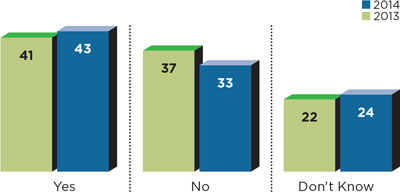 Average Salaries Barely Rise: Following two years of job growth, overall salaries are essentially flat this year.
Average Salaries Barely Rise: Following two years of job growth, overall salaries are essentially flat this year.
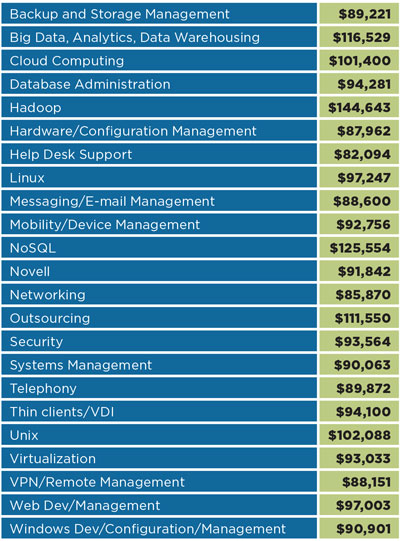 Salary by Technology/Job Function: Big Data expertise will earn you a big paycheck and even more if it includes Hadoop. Linux expertise is up sharply, as well, while those who manage outsourcers also saw a notable boost. Most every other category was either flat or down slightly.
Salary by Technology/Job Function: Big Data expertise will earn you a big paycheck and even more if it includes Hadoop. Linux expertise is up sharply, as well, while those who manage outsourcers also saw a notable boost. Most every other category was either flat or down slightly.
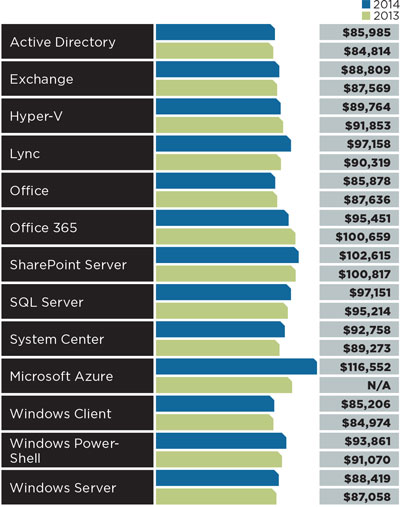 Salary by Microsoft or Product Expertise: Microsoft Azure expertise is by far the most lucrative. Demand for Lync has pushed the average Lync salary up markedly, as well, and Windows PowerShell also saw a respectable boost. After falling last year, the average salary of SharePoint experts has risen, though Office 365 salaries have fallen.
Salary by Microsoft or Product Expertise: Microsoft Azure expertise is by far the most lucrative. Demand for Lync has pushed the average Lync salary up markedly, as well, and Windows PowerShell also saw a respectable boost. After falling last year, the average salary of SharePoint experts has risen, though Office 365 salaries have fallen.
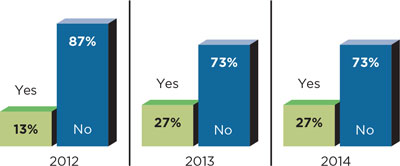 Looking to Change Employers? The number of respondents looking to change employers doubled in last year’s survey and that figure held firm this year.
Looking to Change Employers? The number of respondents looking to change employers doubled in last year’s survey and that figure held firm this year.
David Foote, chief analyst and chief research officer of Foote Partners LLC, a Vero Beach, Fla., researcher specializing in IT employment and compensation trends, agrees, saying those specializing in Azure had the highest earnings power in the third quarter of this year of any Microsoft specialty.
"Of all the non-certified skills, Azure is the highest paying," says Foote, noting that employers are willing to pay an average 9 percent increase in skills-based compensation. Other popular areas are App-V, the Microsoft application virtualization technology, and Microsoft Certified Solution Experts in private cloud, communications server, architects and Microsoft Certified Solutions Masters, Foote says. "There's a lot of demand for architects," one survey respondent said.
Last year's survey showed a marked increase in readers who considered changing employers -- 27 percent compared to 13 percent in 2012. That figure remained consistent this year at 27 percent. With unemployment falling to less than 6 percent nationwide this year, hiring expectations have also improved. "The quickest way to improve your financial situation is to change jobs where someone is willing to overpay to get you in that job," Reed says.
At the same time, Reed works with employers to take steps to retain their existing most valued IT pros. "When we consult with clients, we preach to managers, ‘Your recruiting starts with people on your team, you need to pay them properly, you need to increase their compensation,'" Reed says.
Women in IT
With the backdrop of Microsoft CEO Satya Nadella saying women who want to earn more should rely on "karma," this year's survey looked at how female readers are faring. Of the 1,450 respondents, only 200 -- or 14 percent -- were women. The number of women who said they were in IT management was 53 (4 percent of the respondents), while 420 were men (29 percent of the sample). The average male salary in IT management was $104,655 compared with $100,392 for females.
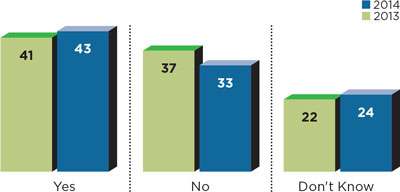 Hiring Expectations Tick up Slightly: The number of respondents who expected to see more job openings has increased marginally.
Hiring Expectations Tick up Slightly: The number of respondents who expected to see more job openings has increased marginally.
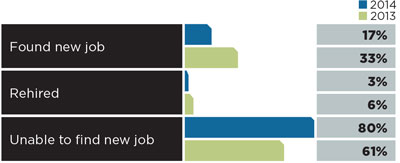 Challenges for Those Laid Off: While only 5 percent were laid off this year, same as last, it has become harder for many of them to find new positions.
Challenges for Those Laid Off: While only 5 percent were laid off this year, same as last, it has become harder for many of them to find new positions.
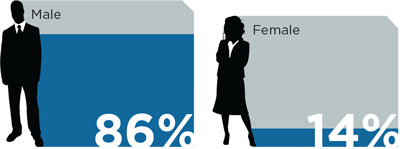 Women in IT: The makeup of men to women responding has remained consistent over the years.
Women in IT: The makeup of men to women responding has remained consistent over the years.
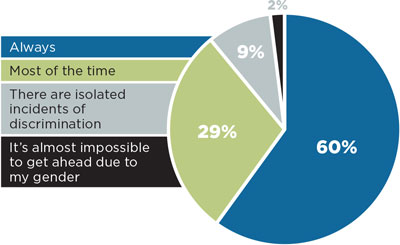 Equal Treatment Regardless of Gender: While a majority said men and women are treated equally, a significant percentage indicated varying levels of gender bias.
Equal Treatment Regardless of Gender: While a majority said men and women are treated equally, a significant percentage indicated varying levels of gender bias.
The number of women responding in other areas of our survey were too few to draw any conclusions, but the disparity of pay for IT managers along gender lines is consistent with other trends. "We see that it's a really big missed opportunity in the marketplace," Reed says, adding that he speaks on that issue frequently. Despite the lack of equality, Reed believes the level of awareness ebbs and flows, but, thanks to Nadella's quickly withdrawn comments and other companies' moves to disclose their efforts to attract women to science, technology, engineering and math (STEM) over the years, he's seeing a slight uptick in the number of women at events.
 Employees Treated Fairly Regardless of Race, Religion or Nationality: Nearly two-thirds reported employees are treated fairly regardless of their faith, race or ethnicity, but there’s also a notable number who said that’s not the case.
Employees Treated Fairly Regardless of Race, Religion or Nationality: Nearly two-thirds reported employees are treated fairly regardless of their faith, race or ethnicity, but there’s also a notable number who said that’s not the case.
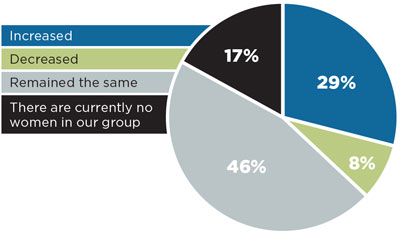 Women in the IT Organization: The presence of women in IT jobs has increased but there are many shops that are all-male.
Women in the IT Organization: The presence of women in IT jobs has increased but there are many shops that are all-male.
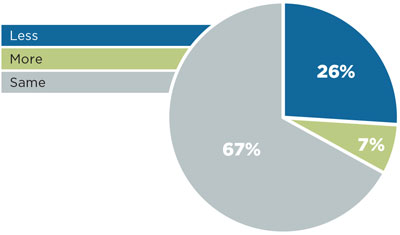 Compensation for Women: While two-thirds of respondents said men and women receive equal pay, more than one-quarter believed women make less.
Compensation for Women: While two-thirds of respondents said men and women receive equal pay, more than one-quarter believed women make less.
"Progress is being made, [but] I would say it's been slower than what a lot of people had hoped," Reed says. "I think the benefit will create some beneficial ripples in the marketplace. People will look back and say that was one of those moments that really started to change the momentum."
About the Author
Jeffrey Schwartz is editor of Redmond magazine and also covers cloud computing for Virtualization Review's Cloud Report. In addition, he writes the Channeling the Cloud column for Redmond Channel Partner. Follow him on Twitter @JeffreySchwartz.